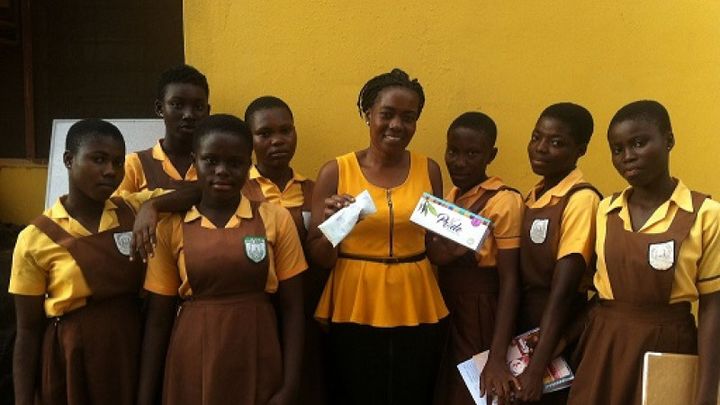
Organic Sanitary Pad Made in Ghana
Tax deductible

“Meet Maridiya Bindan Adjoa. She is 14 years with a 3 weeks old baby. She was deceived by a community teacher after she started menstruating. According to this girl, her parents never educated her on menstruation. When she started menstruating, she told her teacher, and he began supplying her with sanitary pads monthly. One day, the teacher demanded sex, and because she felt indebted to him, she complied. This interaction continued until she got pregnant. The teacher promised to married her, but shortly after he disappeared from the community and no one knows his whereabout. She is now under RECFAM care”
There is a longstanding cultural stigma around menstruation in Sub-Saharan Africa. Still a male-dominated region with men making up the majority of government officials, policy makers, and community leaders, women's sexuality and menstrual hygiene is rarely a topic covered in any public spaces, let alone curriculums. Sex education is typically not a subject covered in public schools. The lack of discussion and understanding, and partially due to religious stigma, has led to the cultural attitude that women and girls are dirty and unclean during their menstrual cycle. Adding to the problem is the fact that there is a general lack of affordable sanitary pads. Many women and girls in poorer rural areas are forced to use unsanitary substitutes like newspaper and cloth, sometimes leading to odor, itching, infections and maternal health complications, making them targets of ridicule and public shaming, and further exacerbating the negative stigma of menstruation in these communities.
The compound issues of cultural stigma and the scarcity of affordable sanitary pads present an often unsurmountable barrier to the quality of life for some women and girls in rural Ghana, Africa. Many women are forced to limit their social lives, temporarily stop working, and are not allowed into some houses of worship and public spaces, risking public shame and embarrassment if they do so. Even more devastating - according to a study by the University for Development Studies, Catholic Relief Services and the Desert Research Institute, 95% of girls miss school during their menstrual cycles. Around 23% of these girls actually drop out of school once they start menstruation, the lack of menstrual hygiene and supplies making them a target for harassment. For women and girls in rural Ghana, the natural process of menstruation often signals the reduced chances of getting an education and achieving a sustainable career and livelihood, and increases the chances of a lowered self-esteem.
This gender-based oppression of women and girls mostly effects ages 12-18 girls and puts them more at risk of sexual exploitation. Sadly, it is often people in their own community that victimize them. Stemming from the lack of education of their bodies, many girls fall victim to sexual predators who trick them into early and forced marriages, child trafficking, teenaged pregnancy, etc.
A lack of hygienic menstrual products and the correlating health education is one of the root causes of gender inequality in Sub-Saharan Africa, and serves as a massive barrier to girls and women. Help us bring an end to this gender inequality by joining the cause of Pride Pad.
At a small production site located in Dome – Accra, Ghana, we have developed and currently produce the Pride pad, a locally manufactured organic menstrual pad. The pad is made from locally farmed banana/plantain fiber, is comfortable, biodegradable, but most of all: affordable.
Together with the Ghana Educational Services (GES), we target at-risk communities and schools and distribute these biodegradable, affordable Pride sanitary pads to women and girls in rural Ghana. Most importantly, we provide education to the communities, and work directly with schools to promote gender equality, and increase girls school attendance.
Every step in the process of Pride Pad engages and empowers women. The site is staffed by mostly local women, and the benefits go right back to the villages. The combined effects of health education and work related to the product improve the self-esteem of women and trickles into the community, helping to change and evolve how menstruation is perceived. School-aged girls are given the confidence to go back to school, and are educated about menstrual hygiene, their bodies and the world around them, reducing their chances of being exploited.
These pads are already in high demand. GES has given us a target to meet, and we cannot keep up with production with our one machine operation. We want to supply more, but increasing production is expensive. Here’s a breakdown for just one production site:
Replicating sanitary pad machines =$10,000.00
Extraction of banana/plantain fiber =$ 3,000.00
Purchase of - Non woven fabric =$ 4,000.00
Generator =$ 1,500.00
Rent for one year =$ 2,400.00
Total =$20,900.00
Pride Pad is a transcendent philosophy that empowers women and girls at every step in the process. By donating today, you provide education, job creation, leadership training, and social entrepreneurship to women/girls in Ghana.
Help us combat the wrongs of gender inequality in Ghana.
Donate today
Organizer
Alfredo Nsodu
Organizer
Boulder, CO
Research and Counselling Foundation for African Migrants (RECFAM) Inc
Registered nonprofit
Donations are typically 100% tax deductible in the US.


